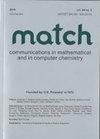Extended Hybrid Controller Design of Bifurcation in a Delayed Chemostat Model
IF 2.4
2区 化学
Q2 CHEMISTRY, MULTIDISCIPLINARY
Match-Communications in Mathematical and in Computer Chemistry
Pub Date : 2023-07-01
DOI:10.46793/match.90-3.609x
引用次数: 22
Abstract
Fractional-order differential models plays a pivotal role in depicting the relationship among concentration changes of various chemical substances in chemistry. In this current study, we will explore the dynamics of a delayed chemostat model. First of all, we prove that the solution of the delayed chemostat model exists and is unique by virtue of fixed point theorem. Secondly, we demonstrate that the solution of the delayed chemostat model is non-negative by applying some suitable inequality strategies. Thirdly, the boundedness of the solution to the delayed chemostat model is explored via constructing a reasonable function. Fourthly, the Hopf bifurcation and stability of the delayed chemostat model are dealt with by exploiting the stability criterion and bifurcation theory on fractional dynamical system. Fifthly, the stability domain and Hopf bifurcation of the delayed chemostat model are resoundingly controlled by making use of an extended hybrid controller. Sixthly, the stability domain and Hopf bifurcation of the delayed chemostat model are effectively adjusted by making use of an another extended hybrid controller. The role of delay in this chemostat model is revealed. Seventhly, software experiments are given to illustrate the rightness of the gained key conclusions. The acquired outcomes of this work are perfectly innovative and have crucial theoretical value in controlling the concentrations of various chemical substances.时滞恒化模型分岔的扩展混合控制器设计
分数阶微分模型在描述化学中各种化学物质的浓度变化关系方面起着举足轻重的作用。在目前的研究中,我们将探索一个延迟趋化模型的动力学。首先,利用不动点定理证明了时滞恒化模型解的存在性和唯一性。其次,采用适当的不等式策略证明了时滞恒化模型的解是非负的。第三,通过构造合理的函数,探讨了时滞恒化模型解的有界性。利用分数阶动力系统的稳定性判据和分岔理论,研究了时滞恒化模型的Hopf分岔和稳定性问题。第五,利用扩展混合控制器对延迟恒化模型的稳定域和Hopf分岔进行了有效控制。第六,利用另一种扩展的混合控制器有效地调节了延迟恒化模型的稳定域和Hopf分岔。揭示了延迟在该趋化模型中的作用。最后,通过软件实验验证了所得关键结论的正确性。这项工作所获得的成果是完全创新的,在控制各种化学物质的浓度方面具有重要的理论价值。
本文章由计算机程序翻译,如有差异,请以英文原文为准。
求助全文
约1分钟内获得全文
求助全文
来源期刊
CiteScore
4.40
自引率
26.90%
发文量
71
审稿时长
2 months
期刊介绍:
MATCH Communications in Mathematical and in Computer Chemistry publishes papers of original research as well as reviews on chemically important mathematical results and non-routine applications of mathematical techniques to chemical problems. A paper acceptable for publication must contain non-trivial mathematics or communicate non-routine computer-based procedures AND have a clear connection to chemistry. Papers are published without any processing or publication charge.

 求助内容:
求助内容: 应助结果提醒方式:
应助结果提醒方式:


